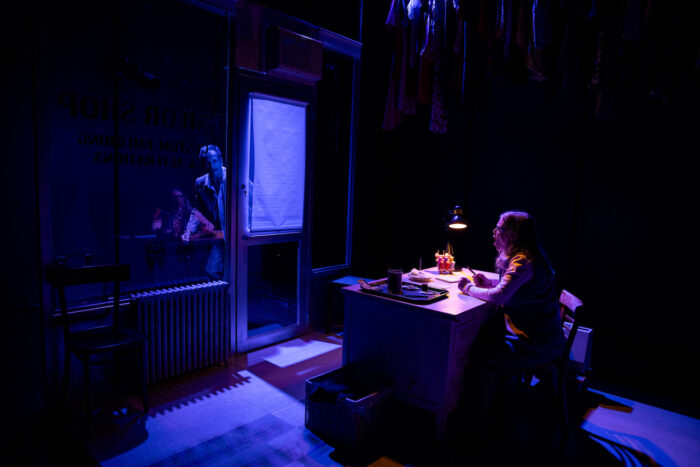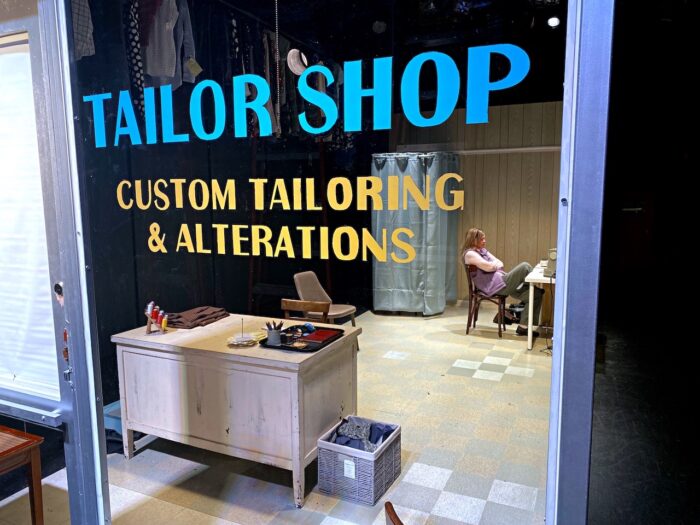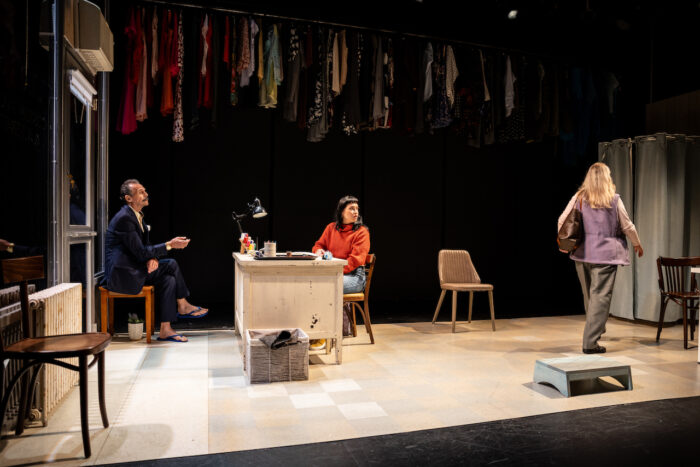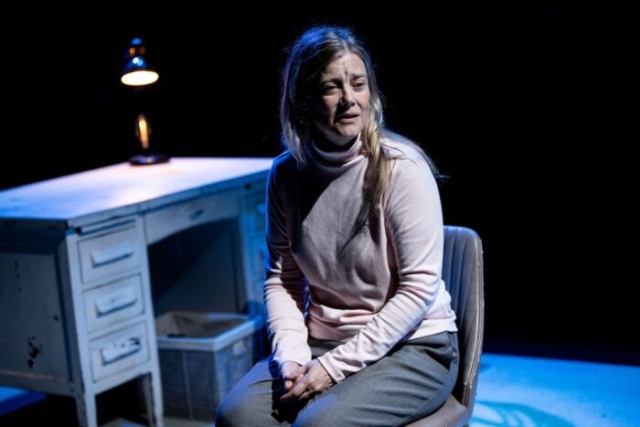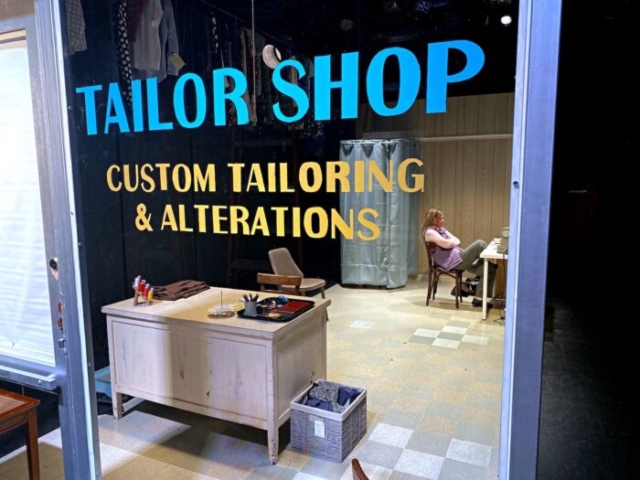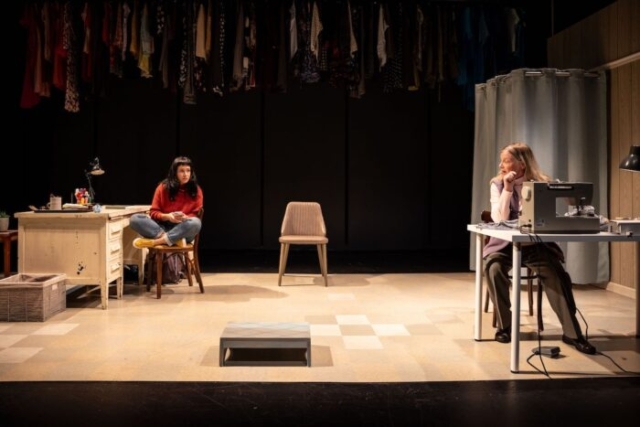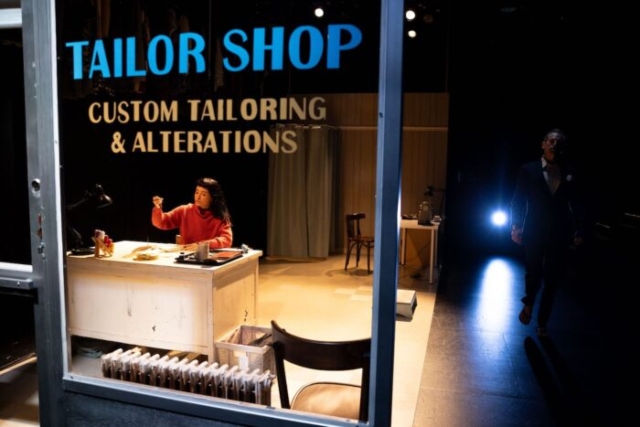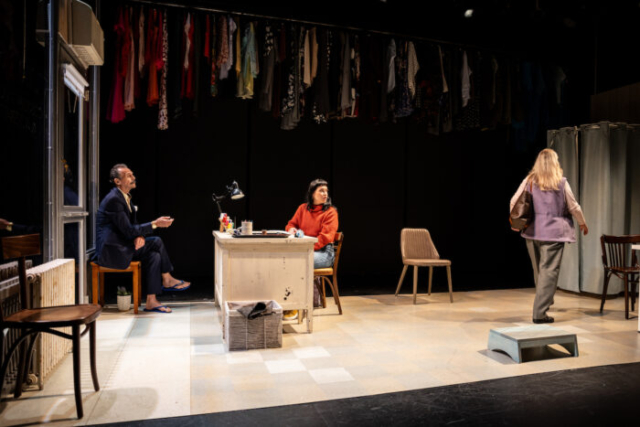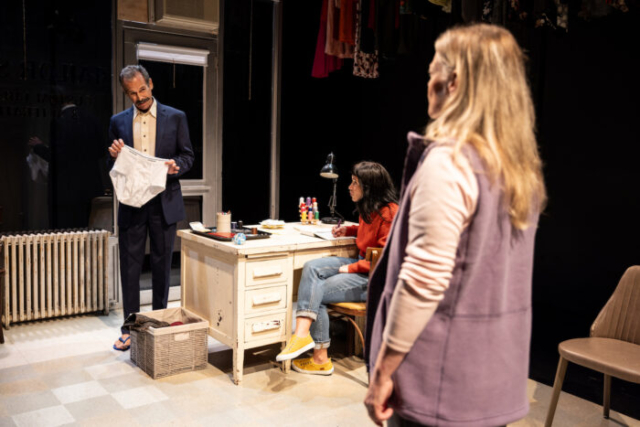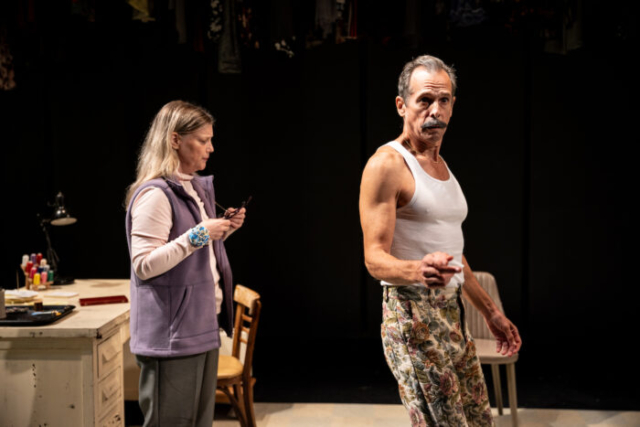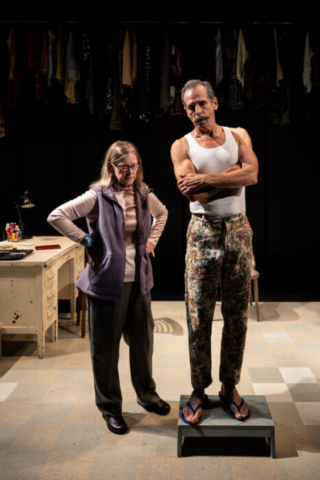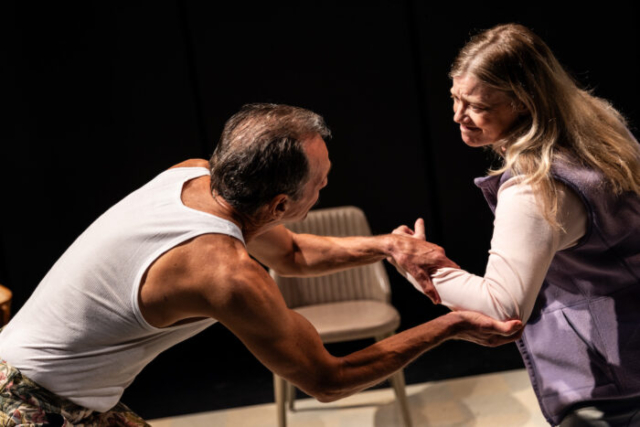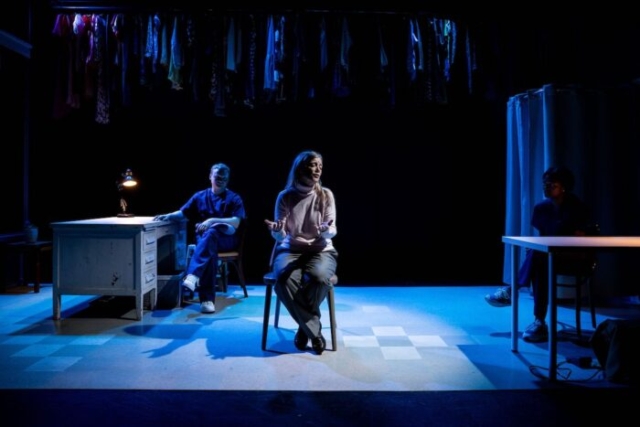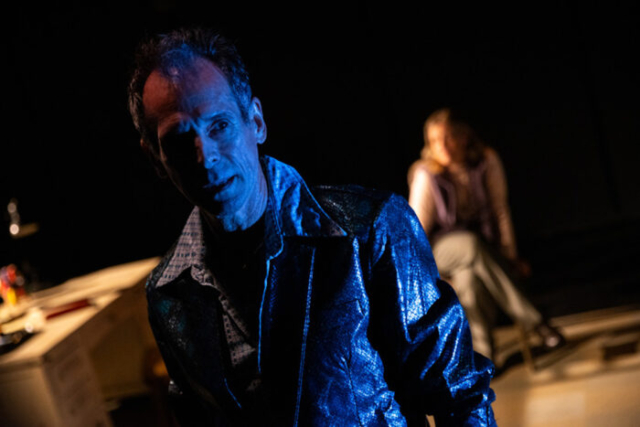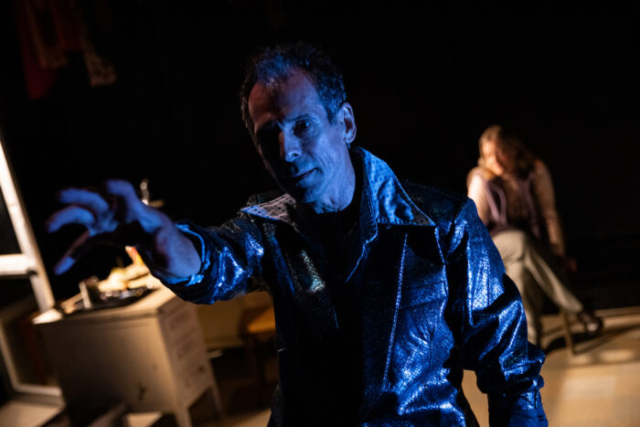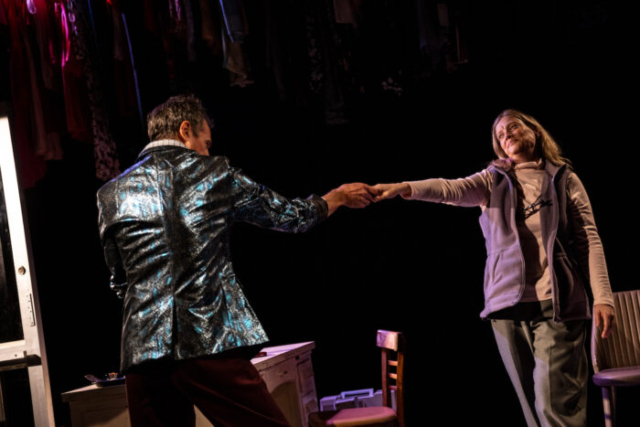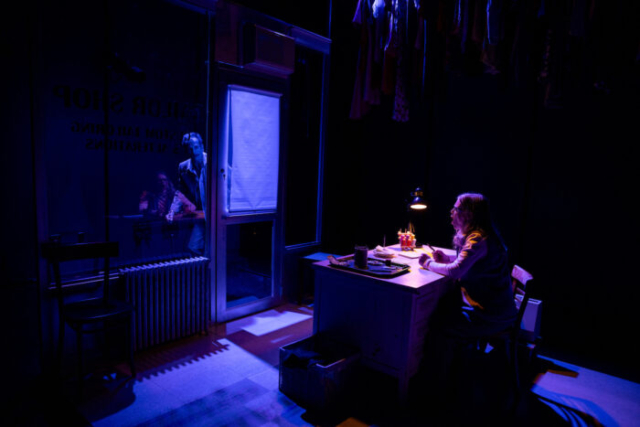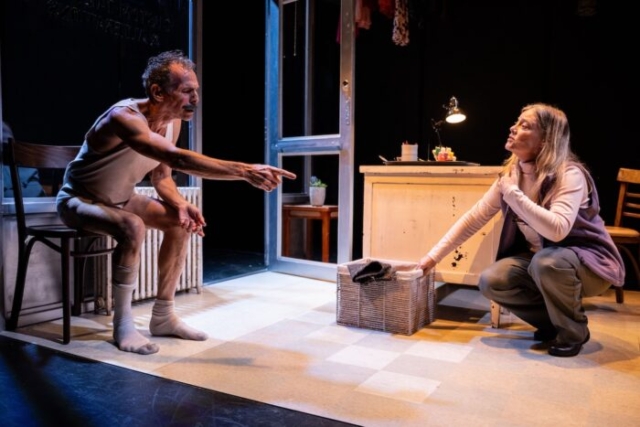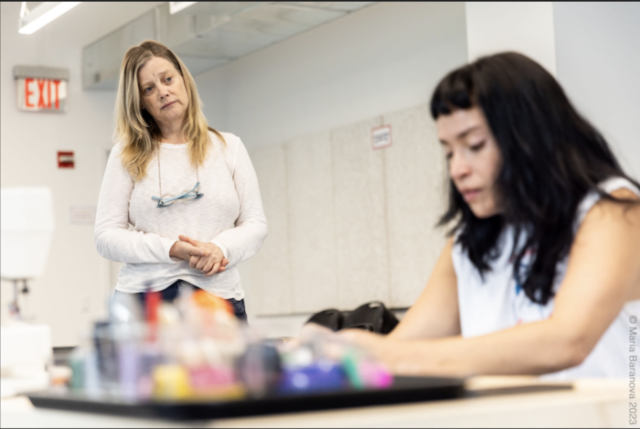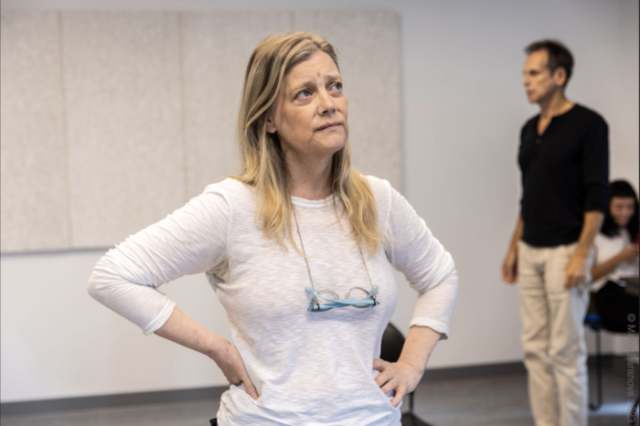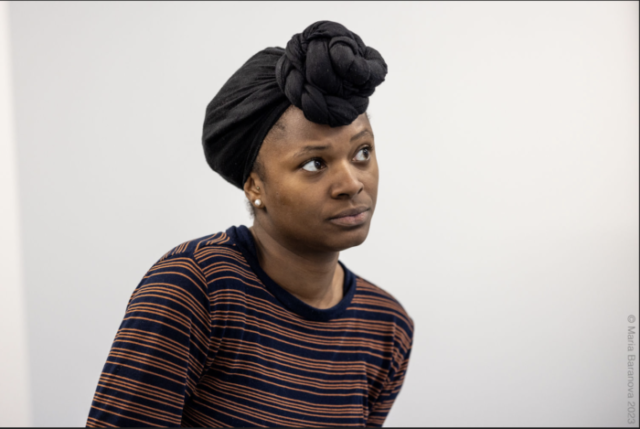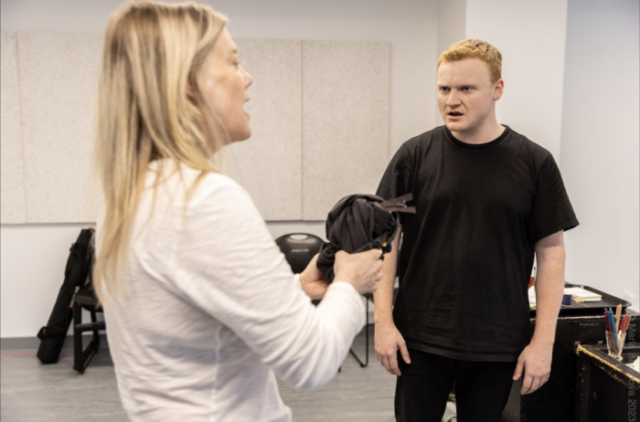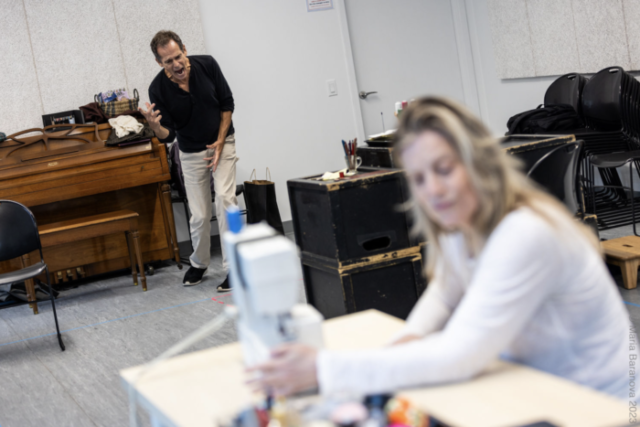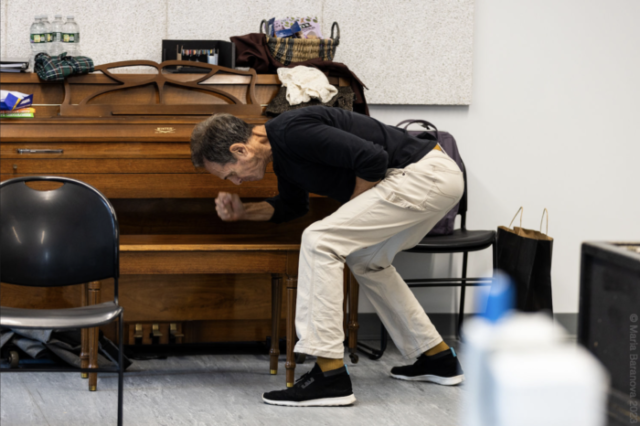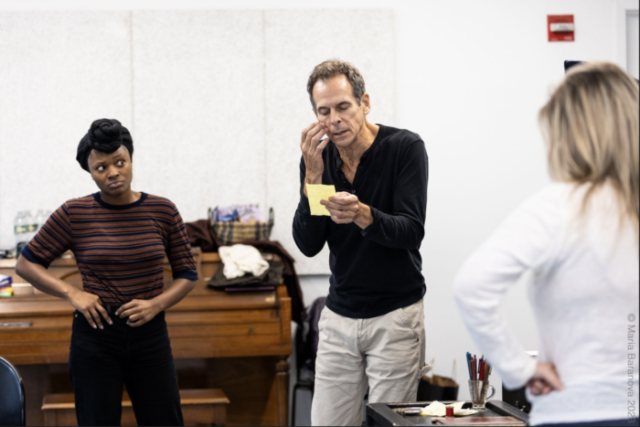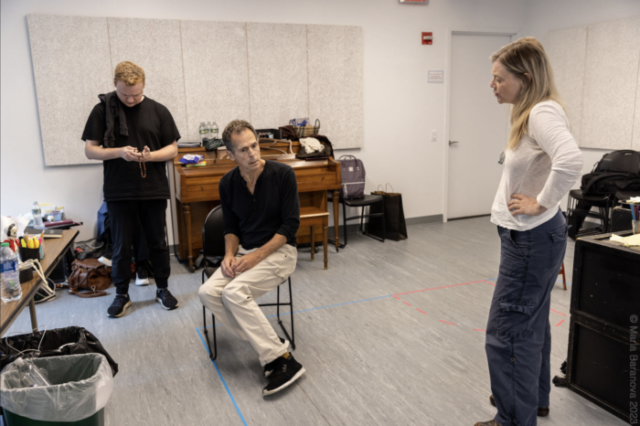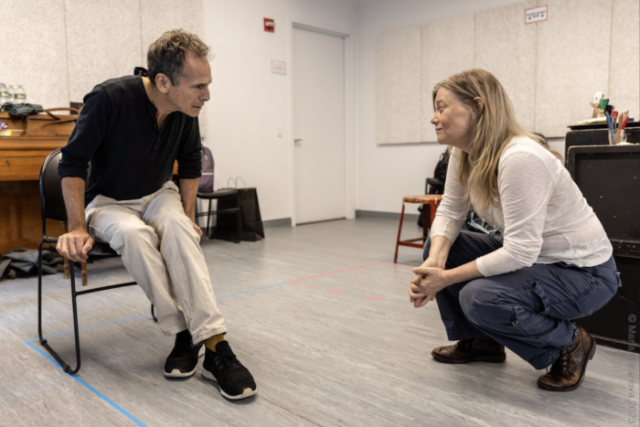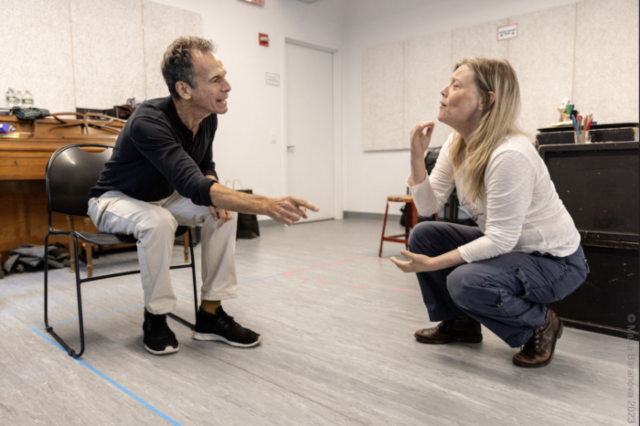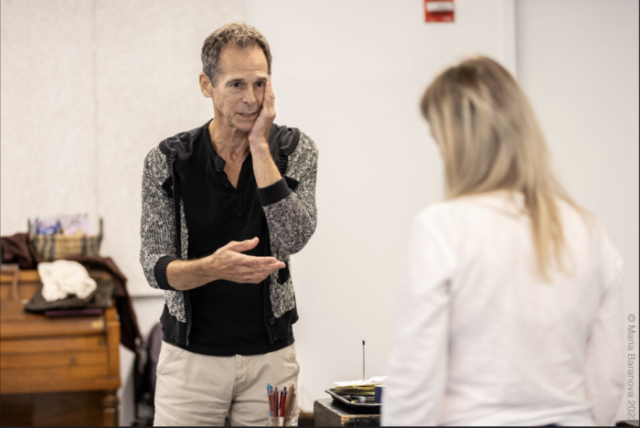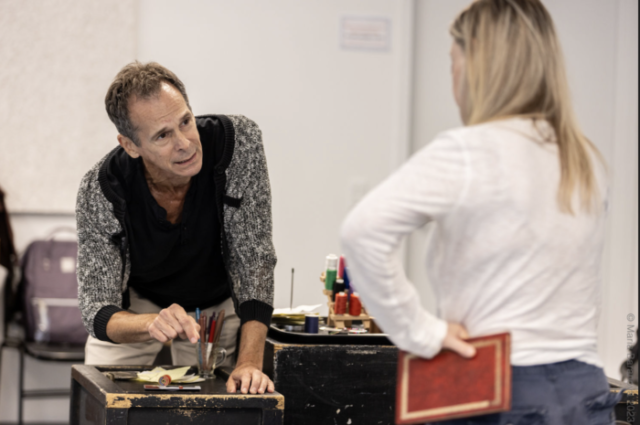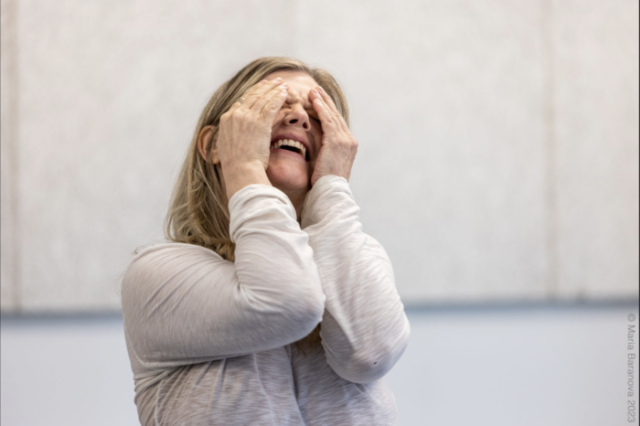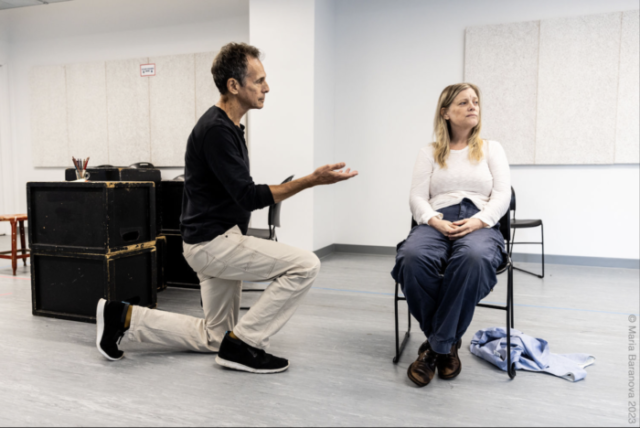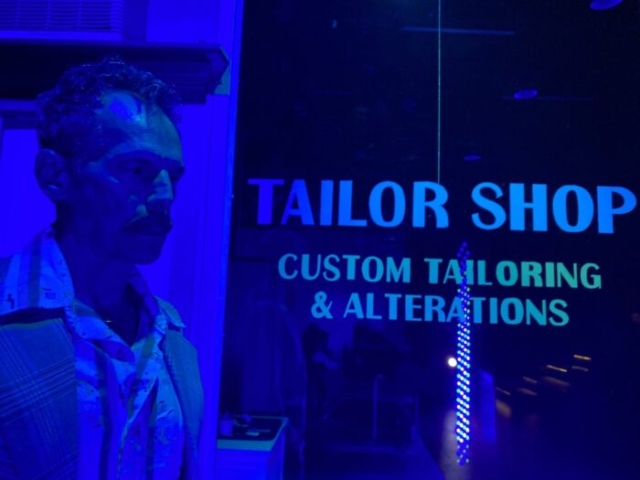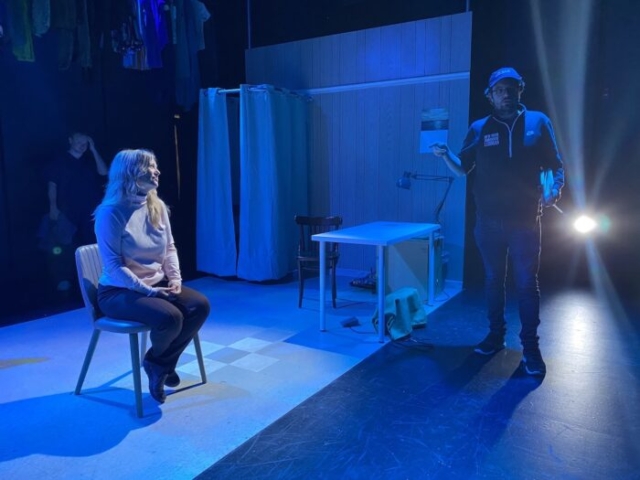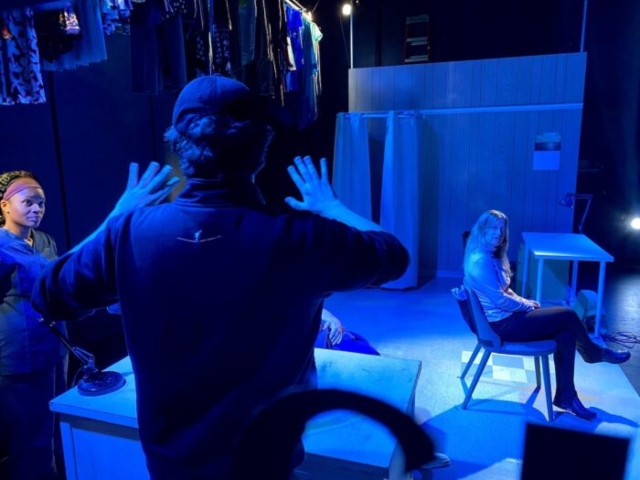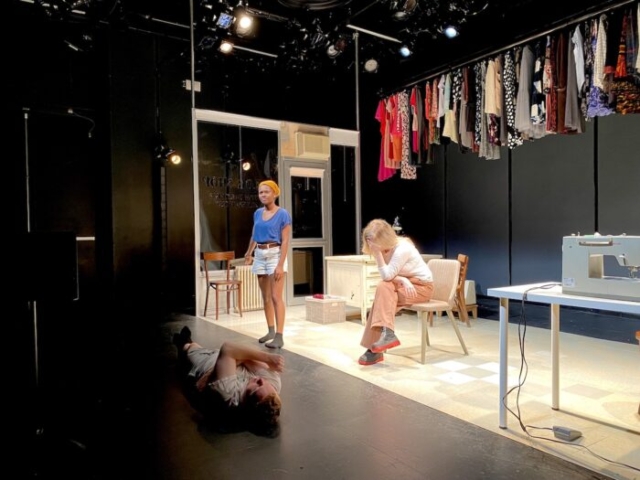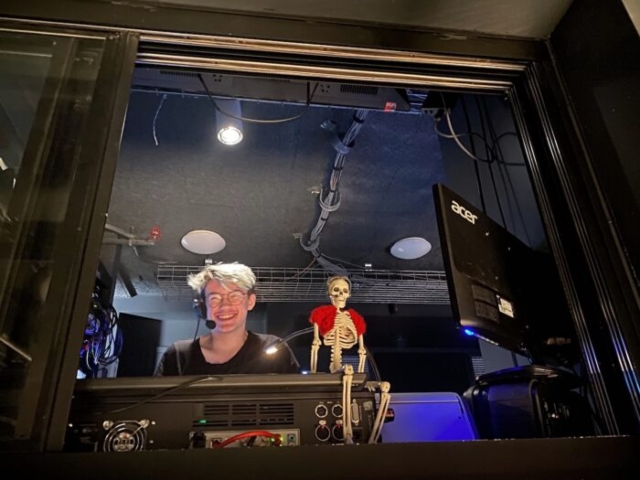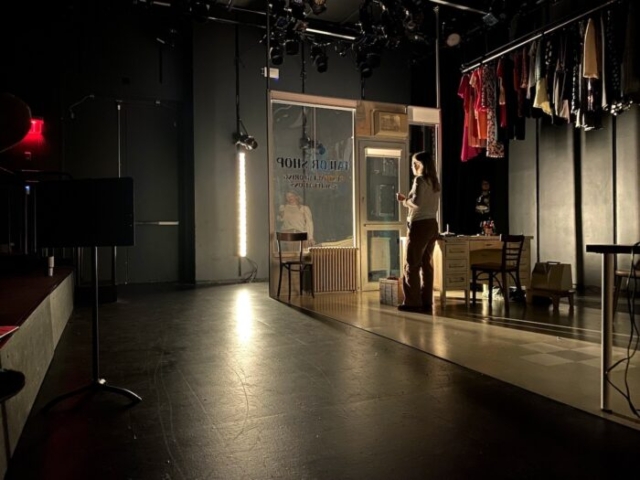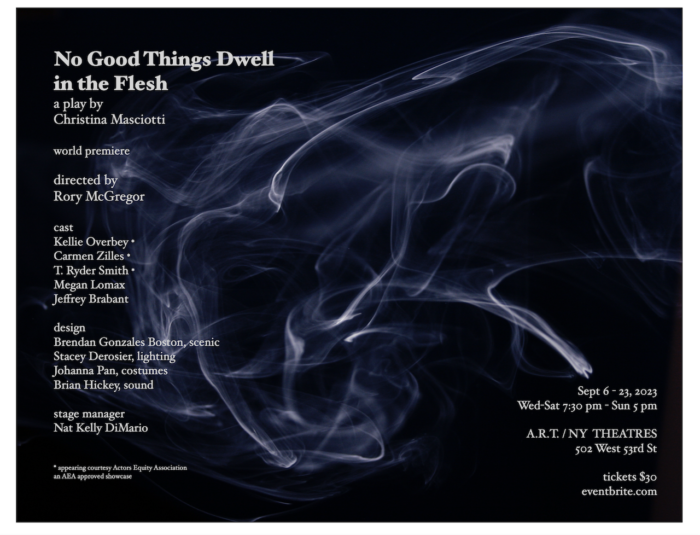photos by Maria Baranova
excerpts from reviews
“Excellent . . . This is a memorable show which easily holds its own against – and bests – many Off-Broadway productions. . . . It tells the story of 64-year-old Agata, a master tailor from Latvia who came to the States when the USSR collapsed. We see the struggles she’s endured being an immigrant starting a tailor shop in Queens, and are awed by the expert craftsperson/artist she has become. 30-year-old Janice is her assistant. Agata hopes Janice will someday, maybe before long, take over the shop so Agata can retire. But Janice isn’t sure as aspects of her personal life evolve. The third primary figure is Vlad, Agata’s ex-lover, who drifts in and out burdening Agata with his emotional baggage. . . . Much of the play is told as a straight-forward narrative, but there are moments where the mood shifts and we realize we’re seeing a past memory, or are witnessing internal monologues. Often segments like that can be jarring, pulling you out of a show’s flow. But here the writing by Christina Masciotti and direction by Rory McGregor are so deft, even the more surreal moments arise naturally and organically from the show’s rhythms. . . . Kellie Overbey is simply masterful as Agatha . . . a performance I won’t soon forget. . . Also dynamic is T. Ryder Smith. He plays a broad range of emotions and moods, and the ways he expresses them are exceptional. This is a meaty (and harrowing, and raw) role, a character who goes through many transformations at different stages, and Smith sets each moment apart with dimensionality and convincing nuance. During one scene, portraying the younger Vlad, I thought he might be a different actor, so complete is the transformation. . . .”
– Cameron Hughes, Front Row Center
“In Christina Masciotti’s keen and unflashy new play, No Good Things Dwell in the Flesh, Kellie Overbey gives a beautifully supple, subtle performance as Agata — a survivor whose wariness of men and their havoc is a defining stance, like her willingness to reject customers if she disagrees with their requests. In a dozen overworked years, she has had only one vacation. So maybe it’s weariness that makes her hope that the talented but unserious Janice (Carmen Zilles) — a student at the Fashion Institute of Technology who already has a business degree — could be a worthy successor, someone Agata might simply give her thriving business to. . . . Masciotti, who based Agata on a tailor she met in Astoria, Queens, is also characteristically drawn here to the richness of language, Agata’s in particular. As when she tells Janice, “The heart shape is kind of my enemy shape.” Or when she orders Vlad (T. Ryder Smith), the handsome but unstable ex who tracks Agata down: “Stop creating all this situation.” The night I saw the show, much of the audience was so busy enjoying Smith’s performance that they didn’t notice the danger in Vlad — even though he tells Agata, moments into their reunion, that it takes just 30 seconds to knock a woman out. Agata, who cares about him still, wants only to keep her distance from him, and from men in general. . . . That’s another thing this play is about, though: the siren song of men and coupledom. Agata has spent her whole adult life trying not to get shipwrecked on those rocks.”
– Laura Collins-Hughes, New York Times
“Delightful as the lead character is, however, the play is marked by a creeping sense of stasis. Masciotti suggests that time is running out on Agata — she is sick of constant hard work, her rent is going up, and she must decide whether to renew her lease – but her situation has little sense of urgency. . . . Mostly, she interacts with Janice, the fantastically indecisive FIT student who serves as her assistant, and, if Agata has anything to say about it, her successor. . . . As played by the always-welcome Kellie Overbey, Agata is a steady source of crisp, acidic amusement. . . . Director Rory McGregor keeps things moving efficiently but he can’t work up drama where none exists. Still, he gets fine work from Carmen Zilles, who goes a long way toward making Janice, the ultimate mouseburger, tolerable, and from T. Ryder Smith as Vlad, whose deterioration is both disturbing and terribly sad.”
– David Barbour, Lighting & Sound America
“The piece is a well-executed portrait, but what is it about? . . . Central pleasure here comes from Kellie Overbey’s terrific performance. We feel as if we’re observing a whole person. . . . T. Ryder Smith creates a man about whom we want to know more. The idée fixe of Agata compels every irrational move. Vlad is palpably unmoored in this actor’s hands. He vibrates and sparks. Performance is unnerving, yet sympathetic. . . . Director Rory McGregor has skill with flow, moving characters in, out, and around the small tailor shop. . . . The play’s visual ending is inspired.”
– Alix Cohen, Woman Around Town
“The title of Masciotti’s play was inspired by a quote from the apostle Paul about law and sin: “For I know that nothing good dwells in me, that is, in my flesh. For I have the desire to do what is right, but not the ability to carry it out.” The three central characters . . . all desire to do what is right, but various factors make them unable to, preventing them from flourishing. . . . The title and the biblical quotes that relate to it are both compelling, but the narrative doesn’t live up to that promise. This is not a tale of good and evil as much as it is a story of characters in search of a happiness they’re not sure they deserve. . . . Overbey is firm and direct as Agata, a woman who doesn’t know how to be happy. Zilles imbues Janice with a kind of wide-eyed wonder, not yet ready for what the world can offer her. Smith plays Vlad with a nervous jitteriness that will make you uncomfortable in your seat.”
– Mark Rifkin, This Week in New York (twi-ny.com)
“While there is a faint whiff of the sinister around the edges of Christina Masciotti’s new play, it doesn’t intensify into anything substantial enough to resemble a real shadow. Both playwright and director are attempting to add spooky aura—and, thereby, thematic heft—to this story about an aging Russian immigrant tailor considering what will become of her shop when she’s gone. . . . No Good Things catches Agata at a contemplative moment. She senses the end of her career looming, and she’d like to pass on her shop to Janice, in whom she sees talent and potential. But poor Janice isn’t just talented — she’s also 30 and single, nervous about those things, and dangerously desperate for affection. As all of that starts to get in the way, and as an unstable ex-lover of Agata’s named Vlad (T. Ryder Smith) wanders back into her life to cause havoc, the tailor’s dreams of leaving a legacy start to slip away.”
– Sara Holdren, Vulture
“The author is most interested in exploring the themes of pragmatism vs. fantasy, practicality vs. impracticality, idealism vs. skepticism and drama vs. realism. Whether all this comes together in the form of a cohesive play is the question. Based on the playwright’s own interactions with an immigrant tailor she befriended in her neighborhood, the material from which she has drawn her main character of Agata feels stage-worthy as well as pulled from the headlines. Even though it was the collapse of the Soviet Union that sent Agata to America, today’s Russia seems no less an oppressive regime with the war against Ukraine a constant drain on human life and its economic welfare. As for Janice, a younger person riddled with anxiety who honestly doesn’t know the meaning of suffering compared with how someone like Agata has made their way in the world, the contrast couldn’t be clearer. Their connection is at the core of the play and, as performed by two actors of intense concentration and commitment, the drama is elevated in a way that makes for some powerful scenes.”
– Ron Fassler, Theatre Pizzazz
full reviews appear below
rehearsals
photos by Maria Baranova
tech rehearsals
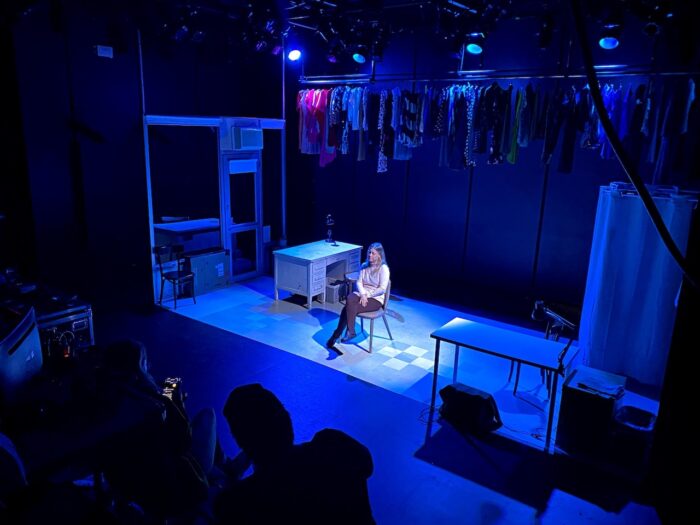
offstage
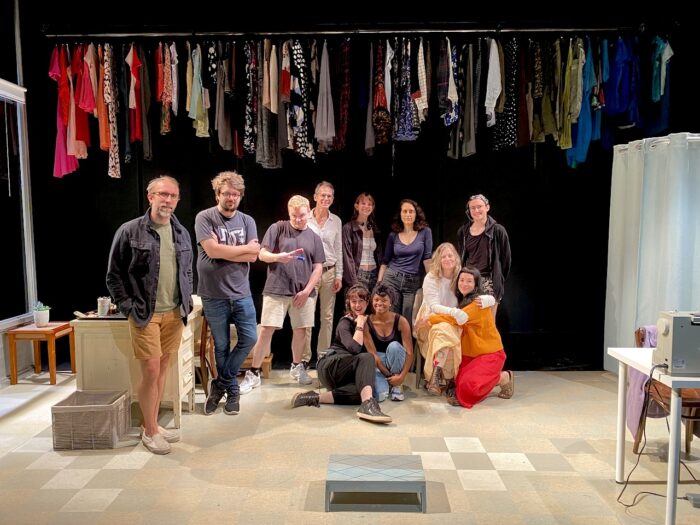

full reviews
Front Row Center, Cameron Hughes – The excellent “No Good Things Dwell in the Flesh” is playing at the Off-Off-Broadway ART/New York Theatres until September 23rd. This is a memorable show which easily holds its own against – and bests – many Off-Broadway productions. “No Good Things Dwell in the Flesh” tells the story of 64-year-old Agata (Kellie Overbey) a master tailor from Latvia and former citizen of the Soviet Union, who came to the States when the USSR collapsed. We see the struggles she’s endured being an immigrant starting a tailor shop in Queens, and are awed by the expert craftsperson/artist she has become. 30-year-old Janice (Carmen Zilles) is her assistant. Agata hopes Janice will someday, maybe before long, take over the shop so Agata can retire. But Janice isn’t sure as aspects of her personal life evolve. The third primary figure is Vlad (T. Ryder Smith) Agata’s ex-lover, who drifts in and out burdening Agata with his emotional baggage. Much of the play is told as a straight-forward narrative, but there are moments where the mood shifts and we realize we’re seeing a past memory, or are witnessing internal monologues. Often segments like that can be jarring, pulling you out of a show’s flow. But here the writing by Christina Masciotti and direction by Rory McGregor are so deft, even the more surreal moments arise naturally and organically from the show’s rhythms. They pull you in and inform, giving the play added depth. Outstanding in the cast is Kellie Overbey who’s simply masterful as Agatha. Her accent is rich and convincing, and her physicality, body language, and expressions are true and seemingly effortless. This is a performance I won’t soon forget. Overbey plays the full journey of Agata’s life and fleshes out the many layers of her character with absolute conviction in a performance which alone is worth the price of admission. Carmen Zilles, though less experienced, impresses in her portrayal of youthful uncertainty. There’s a scene where she has a panic attack which is chillingly spot-on; how Zilles doesn’t pass out from the apparent hyperventilating is a wonder. The struggles she gives Janice are heartfelt and palpable. Also dynamic is Ryder Smith. He plays a broad range of emotions and moods, and the ways he expresses them are exceptional. This is a meaty (and harrowing, and raw) role, a character who goes through many transformations at different stages, and Smith sets each moment apart with dimensionality and convincing nuance. During one scene, portraying the younger Vlad, I thought he might be a different actor, so complete is the transformation. Kudos must also be given to Jeffrey Brabant and Megan Lomax who play various characters. Each actor is grounded and convincing, finding subtle but thoughtful mannerisms for their parts to individualize them. “No Good Things Dwell in the Flesh” is thought-provoking, tender, economical, at times funny, sometimes sad, poignant, and always accessible and engaging. Based on a woman Masciotti knew in life, every word from Agata rings true. Also worth noting is the perfectly dressed, effective set depicting the tailor shop, and the lighting which is well placed and evocative. Complaints are few and minor. At times some of the quieter dialogue gets lost in this intimate black-box theater, and twice there seemed to be problems with the recorded music which cut out momentarily. However, this being a preview show, the issues will no doubt be addressed before opening night Sunday 9/10. I hope this show lives beyond its initial run, it deserves to be seen by a wider audience. 9.11.23
New York Times, Lauren Collins-Hughes – Seeking a Successor – Inside an unassuming storefront somewhere in Queens is a woman you wouldn’t notice if you saw her on the street. The drape, fit and feel of clothes are her passion and her living, but her own outfit is pallid, frumpy — a kind of camouflage. This is Agata, who at 64 is a self-taught tailor with the skill of an artist and an unforgiving eye. When her apprentice, Janice, shows off a photo of her new fiancé, the unevenness of his pant legs is a flagrant red flag. “If you’re ignorant on pants, you’ll be ignorant on wife,” says Agata, a brusque Russian immigrant who married the same man twice by the time she hit 30, divorced him for good, then built an independent life. “Why you wanna take care of this loser?” In Christina Masciotti’s keen and unflashy new play, “No Good Things Dwell in the Flesh”, Kellie Overbey gives a beautifully supple, subtle performance as Agata — a survivor whose wariness of men and their havoc is a defining stance, like her willingness to reject customers if she disagrees with their requests. In a dozen overworked years, she has had only one vacation. So maybe it’s weariness that makes her hope that the talented but unserious Janice (Carmen Zilles) — a student at the Fashion Institute of Technology who already has a business degree — could be a worthy successor, someone Agata might simply give her thriving business to. Directed by Rory McGregor at A.R.T./New York Theaters in Manhattan — with a bit less atmospheric poeticism than the script aims for — “No Good Things” is interested in what it means to lose a business that has quietly woven itself into the fabric of a neighborhood. That’s a resonant concern these days, as so many urban storefronts sit vacant. Masciotti, who based Agata on a tailor she met in Astoria, Queens, is also characteristically drawn here to the richness of language, Agata’s in particular. As when she tells Janice, “The heart shape is kind of my enemy shape.” Or when she orders Vlad (T. Ryder Smith), the handsome but unstable ex who tracks Agata down: “Stop creating all this situation.” The night I saw the show, much of the audience was so busy enjoying Smith’s performance that they didn’t notice the danger in Vlad — even though he tells Agata, moments into their reunion, that it takes just 30 seconds to knock a woman out. Agata, who cares about him still, wants only to keep her distance from him, and from men in general. Thus, I think, her dowdy get-up, hiding her form. (Costumes are by Johanna Pan.) That’s another thing this play is about, though: the siren song of men and coupledom. Agata has spent her whole adult life trying not to get shipwrecked on those rocks. 9.13.23
Lighting & Sound America, David Barbour – In her new play, Christina Masciotti places a captivating character at center stage, then leaves her stranded, dramatically speaking. The title of No Good Things Dwell in the Flesh — an apparent allusion to St. Paul’s letter to the Romans — hints at a kind of moral paralysis but Agata, the heroine, is, conversely, a woman of decision, surprised by nothing life throws at her, and ready to roll up her sleeves and cope with any eventuality. Even when locked inside a play in which nothing happens, she’s fascinating. And, as played by the always-welcome Kellie Overbey, Agata is a steady source of crisp, acidic amusement. A Russian tailor operating out of a shop in Queens, she is both a wizard of her craft and a kind of Slavic Ann Landers, handing out bitter life lessons culled from her own dark history. (The latter includes her father’s detention in a concentration camp, a youth spent living under the Soviet regime, marriage to an alcoholic, and physical separation from her daughter, a banker in the UK.) Speaking in a broken English that sounds like a flurry of bad-news telegrams, she makes mincemeat of anything that carries a whiff of nonsense; her accent, thick as borscht yet thoroughly intelligible, carries its own baleful notes of doom. To a young associate mooning over Hugh Grant, she snaps, “That guy? British asshole, like Winston Churchill.” Casting a malediction on a certain online rating service, she mutters. “Yelp community 100% corrupted place,” comparing it to nothing less than the KGB in its command of dirty tricks. Dispensing altogether with the idea of romance, she pronounces, “Instead men, I prefer spend time with my cat. Very independent, too. Don’t want to be too much held. I respect that.” You might wonder why Agata hasn’t gone out of business, so curt is her approach to customer relations. (She brutally dismisses anyone asking for an alteration of which she doesn’t approve; no “crimes of fashion” for her.) But she has more work than she can handle. A civil engineer in her home country — a career she was unable to continue here — she doggedly acquired her sewing skills, achieving an intensive professionalism that is almost spiritual. Her attention to detail is a kind of gift that she gives to others, a strange state of grace that keeps her grounded in a world ruled by calamity. Delightful as she is, however, the play is marked by a creeping sense of stasis. Masciotti suggests that time is running out on Agata — she is sick of constant hard work, her rent is going up, and she must decide whether to renew her lease – but her situation has little sense of urgency. (The play never suggests what this workaholic, lacking friends or loved ones nearby, might do with her newly acquired free time.) Mostly, she interacts with Janice, the fantastically indecisive FIT student who serves as her assistant, and, if Agata has anything to say about it, her successor. Janice is the virtual opposite of Agata — weak-willed, given to panic attacks, a magnet for various Mr. Wrongs — and the idea that she could run anything seems laughable. “You have business degree,” Agata says, encouragingly. Yes, and it’s a miracle Janice gets out of bed in the morning. Hovering on the sidelines is Vlad, Agata’s former lover, who suffers from some form of mental illness. The role is oddly conceived — initially a humorous nuisance, he gradually becomes more menacing — and his presence often seems strangely irrelevant in the play’s overall scheme. According to the press materials, Agata has a real-life counterpart, with whom Masciotti became fascinated, drawing her out at length and using her history as a dramatic subject. The playwright’s obvious affection for her protagonist has left her dramatically tongue-tied, however. This act of homage is little more than a series of brief episodes designed mostly to give Agata plenty of room to opine outrageously and demonstrate her considerable psychological armor. Director Rory McGregor keeps things moving efficiently but he can’t work up drama where none exists. Still, he gets fine work from Carmen Zilles, who goes a long way toward making Janice, the ultimate mouseburger, tolerable, and from T. Ryder Smith as Vlad, whose deterioration, is both disturbing and terribly sad. The production design shows how clever artists are not deterred by a limited budget. Brendan Gonzales Boston’s set uses a few well-chosen pieces of furniture and a glass wall to evocatively suggest the interior of Agata’s store; the dominant scenic element, a highly placed clothes rack that spans the width of the stage, figures in a neat coup de théâtre that cues the next stage of Agata’s life. Stacey Derosier’s highly sensitive lighting evokes several times of day when not effortlessly slipping into fantasy states. Johanna Pan’s acutely observant costumes give each character a sharp profile; check out the flowered jeans that Vlad wears as a kind of provocation to Agata. Brian Hickey’s sound design is harder to judge, as on the night I attended there were a few glitchy cues as well as aural competition from (I think) the theatre’s noisy air delivery system. But his choice of musical selections by the British electronic artist Four Tet and the Dionne Warwick version of “Walk on By” seem particularly well-chosen. Masciotti is obviously talented, with a gift for dialogue — I treasure Janice’s comment, “I’m throwing my back out cringing” — and I imagine we’ll be hearing from her again. Next time, one hopes, she’ll weave a little more conflict into her dramatic fabric. Meanwhile, Overbey is providing her with excellent support. 9.11.23
Woman About Town, Alix Cohen – Agata (Kellie Overbey) is a 64 year-old Russian immigrant divorcée whose accent and syntax retain signs of origin. Having taught herself sewing and alterations, she owns a tailor shop, succinctly called Tailor Shop. The modest establishment is successful enough to pick and choose jobs and clients: No zippers – too much time running around town trying to match an original. No one who won’t accept her diagnosis of what needs to be done. Agata is honest, abrupt, pragmatic and perceptive. She adheres to high standards. In exchange for learning skills, naïve 30 year-old assistant Janice (Carmen Zilles) floats in and out taking assignments between moaning about the difficulty of finding a mate. She has sufficient burgeoning talent for Agata to invest time and energy in hopes the young woman might take over – but no discipline. “You can be a lawyer or a doctor in ten years. You can’t be alteration in ten years,” the tailor notes. After endless unsatisfactory online-generated dates, Janice meets and goes overboard about Eddie who will inadvertently change everything. One day, Vlad (T. Ryder Smith), a Romanian immigrant, comes looking for Agata. The first in a succession of forays is to request pockets in his skivvies in order to smuggle money. She throws him out. The second is to take in a pair of pants that appear to fit perfectly. When Agata puts her fingers in the back of the waistband, he practically swoons. They knew one another years ago ostensibly before he became mentally unstable. Agata is at a point in her life when she’s ready to move on. The character is beautifully written as is every reference to and description of alternations. While the other two principals also seem authentic, Janice is much less interesting than Vlad whose expansion might make a better play. What was their liaison like? How would it reveal more about Agata? When and why did his mind go south? Central pleasure here comes from Kellie Overbey’s terrific performance. We feel as if we’re observing a whole person. Her accent is understated, sustained. (Dialect Coach-Charmian Hoare) One wonders whether the actor has given her character a backstory. Agata knows what she wants and what she won’t put up with. Overbey imbues her with history that’s taught her to protect herself. Whatever maternal feelings she musters are visibly directed toward Janice who must, her mentor knows, find her own way. T. Ryder Smith creates a man about whom we want to know more. The idée fixe of Agata compels every irrational move. Vlad is palpably unmoored in this actor’s hands. He vibrates and sparks. Performance is unnerving, yet sympathetic. As Janice, Carmen Zilles offers susceptibility, confusion, hope, tremulous ability to risk. She’s protective of Agata but respectfully bows to wishes she doesn’t understand. A credible turn. Also with Megan Lomax and Jeffrey Brabant. There’s a single reference to kidney ailment. Towards the end, three characters- two unnecessary – appear in scrubs. Is the tailor hiding lethal disease? A press release refers to her confronting mortality. We never see it. Allusion to a daughter in London is also extraneous. The piece is a well executed portrait, but what is it about? Director Rory McGregor has skill with flow, moving characters in, out, and around the small tailor shop. (An invisible wall breaks twice, however, when actors enter without its otherwise important/focal door.) Agata’s gestures are those of someone who had to explain with her hands before language (English) was available to her. Her bearing is aptly proud, sharp, and stiff. Janice is believably loosey goosey. Vlad’s emotional issues are vividly manifest. The play’s visual ending is inspired. A single physical confrontation is wincingly real. (Fight Choreographer John Blair) Brendan Gonzales Boston’s minimal set design is appropriate; a suspended line of hanging clothes both a good visual and evocatively used. Costumes by Johanna Pan reflect personality. Vlad’s street clothes with rubber thongs, for example and his sleezy seduction outfit; Agata’s perpetual, well worn cardigan sweater, as if she’s innately cold. I don’t buy Janice’s high style hairdo change. I have no clue what the title means. 9.11.23
This Week in New York, Mark Rifkin – There’s a loose thread dangling through much of Christina Masciotti’s No Good Things Dwell in the Flesh, hanging in there until it’s finally pulled and the previously moving play comes undone. The show is set in 2019 in a tailor shop in Astoria run by Agata Priechev (Kellie Overbey), a straightforward Soviet immigrant. She has hired Janice (Carmen Zilles), one of her students at FIT, as her apprentice. Janice, from a family of Brazilian descent, is approaching thirty, and while Agata is teaching her how to be an expert seamstress, Janice is getting advice that translates as life lessons as well. Agata’s devotion to and love of her craft makes tailoring a vocation, more than a job, and she does her best to call Janice to that as well. “Everybody knows dying profession. It’s dying because it’s hard way to learn and you have to be creative. People doesn’t wanna learn. It’s time taking. Again, again until perfection,” Agata says in her broken English. “You never see young people working in alterations. You can be lawyer or doctor in ten years. Can’t be alterations in ten years. Now click on internet, make a lot of money. With this you can’t just click, you have to work a hundred years. I prefer this but. Last week, I was stitching so many things, I fell asleep on my couch. Tomorrow will be third, I have to do jacket, two things will go home with me. At home I don’t have that spare of a moment. I can’t continue like this. All of a suddenly, I realized in twelve years I had one vacation. I’m sixty-four. Life will be over soon. I need a vacation.” Agata, who has a daughter living in London, has decided to take more than just a vacation; she wants to retire and give the shop to Janice, who isn’t sure she’s up to the responsibility and the commitment. Janice has trouble putting down her cell phone and is busy trying to find the right man to settle down with. While she starts dating an old high school friend, Agata is being harassed by Vlad (T. Ryder Smith), a Romanian man from Venezuela who has been obsessed with her since they met at Bloomingdale’s twelve years earlier. Vlad, who could be an Eastern European spy, a sexual predator, or an immigrant with mental health issues, shows up at odd times, asking for strange alterations and making unfounded accusations. Agata remains steadfast, as if Vlad is part of the unhappy old days that she has put behind her. “The past is dead body in basement,” Agata tells Janice. As Janice weighs her future with Eddie, Agata fights off Vlad, grumpily refuses to take on jobs she doesn’t want to do, and attempts to prepare Janice to take over the business. The title of Masciotti’s 105-minute play (without intermission) was inspired by a quote from the apostle Paul about law and sin: “For I know that nothing good dwells in me, that is, in my flesh. For I have the desire to do what is right, but not the ability to carry it out.” The three central characters — Jeffrey Brabant, Annie Fang, and Megan Lomax appear in multiple minor roles, portraying various customers and police officers — all desire to do what is right, but various factors make them unable to, preventing them from flourishing. Director Rory McGregor can’t quite weave all the materials together into a satisfying whole. Brendan Gonzales Boston’s set is open on several sides, making it difficult to understand the geography surrounding the tailor shop, especially near the end, when characters start walking through areas that previously seemed to be invisible walls. A rack of clothes hanging from above in the back is a deft touch, as if representing Agata’s achievement over the years. Given the setting, Johanna Pan’s costumes are not exemplary, although I’m still a bit creeped out by Vlad’s preference for mandals no matter what else he’s wearing. The steady lighting is by Stacey Derosier, with sound by Brian Hickey. The next line of the Bible quote, from Romans 7:19, reads, “For I do not do the good I want, but the evil I do not want is what I keep on doing.” The title and the biblical quotes that relate to it are both compelling, but the narrative doesn’t live up to that promise. No Good Things Dwell in the Flesh is not a tale of good and evil as much as it is a story of characters in search of a happiness they’re not sure they deserve. Masciotti (Raw Bacon from Poland, Social Security) leaves too many threads untied, too much unused cloth on the cutting-room floor. Overbey is firm and direct as Agata, a woman who doesn’t know how to be happy. “Tailor are special people,” she tells Janice. “You know it’s dying profession.” Zilles imbues Janice with a kind of wide-eyed wonder, not yet ready for what the world can offer her. Smith plays Vlad with a nervous jitteriness that will make you uncomfortable in your seat. No Good Things Dwell in the Flesh start off with a good pattern but, in the end, could have used more custom tailoring and alterations. 9.13.23
Vulture/New York magazine, Sara Holdren – Shadows and Seams, Both Visible – “For I know that in me (that is, in my flesh) dwelleth no good thing: for to will is present with me; but how to perform that which is good I find not. For the good that I would, I do not: but the evil which I would not, that I do.” That’s Romans, chapter 7, verses 18 and 19, King James Version. As sources for titles go, it’s a pretty weighty one. One could reasonably suppose that a play called No Good Things Dwell in the Flesh might have a kind of Flannery O’Connor menace about it — an interest in hearts of darkness and touches of evil. But while there is a faint whiff of the sinister around the edges of Christina Masciotti’s new play, it doesn’t intensify into anything substantial enough to resemble a real shadow. Both playwright and director (Rory McGregor) are attempting to add spooky aura—and, thereby, thematic heft—to this story about an aging Russian immigrant tailor considering what will become of her shop when she’s gone. The play, however, asserts its own straightforwardness inside its muddled gothic trappings: It’s not really a full-fledged metaphysical drama, but it’s a decent character study. Our no-nonsense heroine is Agata (Kellie Overbey), who runs a tailor shop in Queens. Born in the Soviet Union (“When Russia broken, I lost citizenship,” she says bluntly, as she says everything), she found herself in Latvia and then, years later, in alterations at Bloomingdale’s, and now, after much struggle, behind her own counter in Astoria. She’s a master of her craft, but appreciation for her kind of painstakingly won expertise is fading. “Everybody knows dying profession,” she huffs to her sweet-natured assistant, Janice (Carmen Zilles). “It’s dying because it’s hard way to learn and you have to be creative. People doesn’t wanna learn…. Now click on internet, make a lot of money. With this you can’t just click, you have to work a hundred years.” Agata’s terse, unsentimental rhythms come from Masciotti’s own Russian tailor in Astoria. After a long time as a customer, the playwright has said, “I approached her about wanting to write a play based on her life. Her immediate response was, ‘I always knew this would happen.’ She pulled up a stool, and I spent six months by her side.” A playwright’s dream! And Masciotti has the ear for it. As a woman with piles of hard-earned experience, and as an immigrant and a service worker who has frequently been looked right through, Agata has plenty to say, and Masciotti skillfully renders her distinctive way of saying it. I sometimes found myself thinking of Alex, the criminally charming translator who narrates Jonathan Safran Foer’s Everything Is Illuminated. The novel’s vitality comes from Alex’s voice, with its buoyancy and confidence, its slightly jangly English and wonky figures of speech. Agata would no doubt class Alex as she does “taller men”—“more stupid. Certain amount proud of themself. For nothing.”—but her own particular idiom is likewise the bedrock and the delight of her author’s story. It’s easy to understand why Masciotti was eager to spend six months listening. If a play is for the most part powered by a single and singular voice, then it needs an actor who can provide that engine — and Overbey can. She flows through Agata’s outpourings of opinion and pronouncement at speed (which is necessary to give them their bite and their humor), and she furrows her brow and hunches her shoulders just the right amount for a woman who’s usually bent over a sewing machine. Costume designer Johanna Pan’s look for her—cheap gray polyester slacks, a turtleneck, an old purple fleece vest, sensible shoes—also feels right on: the paradox of a craftsperson who has dedicated her life to the beauty inherent in the most delicate stitch and the most perfect pleat, and also spends less than five minutes dressing herself each day in an outfit from Marshalls. No Good Things catches Agata at a contemplative moment. She senses the end of her career looming, and she’d like to pass on her shop to Janice, in whom she sees talent and potential. But poor Janice isn’t just talented — she’s also 30 and single, nervous about those things, and dangerously desperate for affection. As all of that starts to get in the way, and as an unstable ex-lover of Agata’s named Vlad (T. Ryder Smith) wanders back into her life to cause havoc, the tailor’s dreams of leaving a legacy start to slip away. So if she’s so vivid, why does the play sink? The problem is mostly an inflated and aesthetically fuzzy sense of its own seriousness. McGregor and his lighting and sound designers, Stacey Derosier and Brian Hickey, intersperse the scenes in the tailor shop with interludes that aspire to strangeness but end up more woo-woo: The space goes purple and shadowy, sliced through by the glow of an LED tube mounted on one wall, murky tones of not-quite-music hanging in the air. Sometimes this atmosphere even bleeds into the start of scenes — a gesture that feels more muddy than potent. As the play advances, Vlad’s appearances become increasingly unhinged, and Agata finds herself more and more trapped in the moody-blue liminal moments. During one, as she speaks to a spectral customer (Jeffrey Brabant and Megan Lomax play various visitors to the shop), she even pauses to gaze balefully out at us and intone: “It’s hard, it takes so long time. Time, time, and time and time. I don’t have.” Overbey—whose performance is usually sharp—is saddled with the task of putting a pregnant pause between each utterance of the word “time.” Without venturing too far into spoilerland, it seems fair to point out that the play prefaces itself with the punny but super-serious tagline: “An aging Russian tailor must confront the one thing she can’t alter — her own mortality.” Sometimes, weighty implication can feel more heavy-handed than just stating the thing straight out. This is the side effect writing teachers don’t mention when they preach “show, don’t tell.” From tagline on down, McGregor and Masciotti seem committed to cranking up the existential heft of their tale. (And then there’s that title: Really? No good things? I mean, we’re not in a Cormac McCarthy novel here.) Crucially, this added solemnity doesn’t actually raise the stakes. Why does Agata need to be facing the end of her life for us to care about her? I don’t know if it makes me heartless, but none of the play’s dancing with death upset me as much as Agata’s simple confession to Janice: “The rent going up next year and it was extra much before that…. In three month my lease is up, I have to decide what to do with this place.” The sad incompatibility of Agata’s and Janice’s individual yearnings is the real substance of No Good Things. And when the play floats, it’s in large part due to the strengths of its two leads. Zilles and Overbey play generously with each other, and Zilles brings a poignant, very believably millennial combination of bighearted hopefulness and crushing anxiety to Janice. For a long time, she seems to be, as Agata notes wryly, “No bad words. Everything pinky for you. Pinky beautiful.” Then Janice has a panic attack, and Agata’s talking her down is one of the high points of the play. It brings Masciotti back to her happy place—the detailed observation of character—and it is at once deeply caring and extremely Russian: “Here,” she throws a shirt at Janice. “Work so you can breathe.” 9.11.23
[comment on above review posted on the Vulture page by clover98: I saw the show last night and really enjoyed it. Stellar performances, sharply observed characters. I thought the story had dramatic heft and was whole; I didn’t feel the reviewer’s distinction between “metaphysical” and “character study.” Agata immigrated, worked, made a life and craft and a good reputation, despite Yelp, for herself, and what is going to happen to it when the rent goes up? I loved Agata’s sharp wit, her blunt determination, and how the actress captured her moments of warmth. I loved how the male character is situated in the story. He’s like a decorative object that appears occasionally to entertain or bother the women, he has the role that women used to have in stories. But nobody is striving to earn his attention or keep his love or anything; he’s just a minor, if deeply felt, part of the main character’s life. It’s a great performance– ranging through all the character’s vanity, threat, and selfishness to reveal what appealed to Agata. I found the scene where she remembers how they once were very moving.]
Theatre Pizzazz, Ron Fassler – In Christina Masciotti’s new play, No Good Things Dwell in the Flesh, two women work together in a tailor shop in the Astoria section of Queens. Agata, the owner, is an aging Russian of fierce independence, while her protégé, Janice, is a flighty and insecure thirty-year-old Queens native. Their interactions over the course of 95 minutes consist of a series of scenes that repeatedly highlight and magnify their differences. Besides one character being twice as old as the other, a significant culture clash is at play, as well as one being a realist and the other a dreamer. The author is most interested in exploring the themes of pragmatism vs. fantasy, practicality vs. impracticality, idealism vs. skepticism and drama vs. realism. Whether all this comes together in the form of a cohesive play is the question. Based on the playwright’s own interactions with an immigrant tailor she befriended in her neighborhood, the material from which she has drawn her main character of Agata feels stage-worthy as well as pulled from the headlines. Even though it was the collapse of the Soviet Union that sent Agata to America, today’s Russia seems no less an oppressive regime with the war against Ukraine a constant drain on human life and its economic welfare. As for Janice, a younger person riddled with anxiety who honestly doesn’t know the meaning of suffering compared with how someone like Agata has made their way in the world, the contrast couldn’t be clearer. Their connection is at the core of the play and, as performed by two actors of intense concentration and commitment, the drama is elevated in a way that makes for some powerful scenes. The seasoned stage veteran Kellie Overbey brings maturity and an unsentimental strength to Agata. The Russian accent she deploys, aided by the honesty with which the playwright has written the character, allows Overbey to deliver the goods. Ten years ago, I enjoyed her immensely in Gina Gianfriddo’s Rapture, Blister, Burn at the Geffen Playhouse, where she gave a performance of great variety and nuance. Carmen Zilles, excellent in the recent Epiphany, a lovely play by Brian Watkins done at Lincoln Center Theatre last season, plays a very different woman here. Mature and assured in that one, Zilles’s portrayal of Janice is the polar opposite. And though she could easily be portrayed as flighty, Zilles finds dimensions of depth and color to Janice that permeate the work. She brings an emotional complexity as well as an outstanding ability to stay present and in the moment. Rarely on stage without the other, Overbey and Zilles share a palpable bond that at some points transcends Masciotti’s play. In the course of the action, Agata tries to convince herself that her time at the shop is over and that Janice could conceivably take over the business, but that’s wishful thinking. It’s never going to happen and the series of events that take us to the inevitable conclusion presents problems that should be addressed in future productions. The inclusion of a former boyfriend of Agata’s, now a disturbed and unstable stalker, feels shoehorned in to create some drama outside the women’s relationship. It doesn’t come off as organic in spite of a noble effort on the part of T. Ryder Strong who plays him. As directed by Rory McGregor on a very believable set by Brendan Gonzales Boston, the balance of the production feels right. McGregor certainly gets fine performances from all involved, including Jeffrey Braband and Megan Lomax in minor roles. The costumes by Johanna Pan lend authenticity and color and Stacey Derosier’s lighting is evocative. Credit goes to Charmian Hoare’s dialect coaching of Overbey’s authentic Russian accent (at least to this critic’s ear). No Good Things Dwell in the Flesh is a quote from the Bible. It’s not included in the program, but for those curious, a Google search brings it up in a nano-second: “For I know that in me (that is, in my flesh) dwelleth no good thing: for to will is present with me; but how to perform that which is good I find not. For the good that I would I do not: but the evil which I would not, that I do.” 9.12.23
TheatreScene.net, Brett Singer – Everyone loves a good immigrant story, from The Godfather on down. No Good Things Dwell in the Flesh doesn’t reach that high, but it succeeds in what it tries to do, which is to be an accurate portrayal of a specific experience. Agata (played by reliable veteran Kellie Overbey) is an aging Russian tailor with a shop in Queens who wants to retire. She’s 64 years old and hasn’t had a vacation in 12 years. She’d like to give the shop to her young assistant Janice (Carmen Zilles). Janice is interested but also boy crazy and generally doesn’t have good judgment. The play is essentially a character study of Agata, who is based on a real tailor the playwright, Christina Masciotti, knows. “Whenever I went to see her, I was always struck by something she’d say. And her level of expertise was astounding,” Masciotti said in press materials. “Eventually I approached her about wanting to write a play based on her life. Her immediate response was, ‘I always knew this would happen.’ She pulled up a stool, and I spent six months by her side.” This is an admirable level of research but the side characters, Janice and Vlad (T. Ryder Smith of Underneath the Lintel), are more compelling. Vlad is mentally ill and obsessed with Agata. How did he get this way? Based on a flashback scene he used to be a functioning member of society. Now he’s showing up at Agata’s shop unwashed and in his underwear; Smith’s acting is so strong you can practically smell the B.O. Janice, a millennial obsessed with her phone and a desire to get a boyfriend, is equally intriguing. She is immediately recognizable as a young person lost in a complex world. A scene where she has a panic attack is a highlight in no small part due to Zilles’ acting and Rory McGregor’s direction. (He was the associate director on The Lehman Trilogy.) Agata talks her down through the power of sewing, which is interesting to watch but could have been more of a theme in the play. The set (by Brendan Gonzales Boston) looks like a tailor shop, with a huge rack of clothes in the background (something cool happens to them at the end). Stacey Derosier’s lighting is solid, with a nifty LED strip on the wall. Masciotti is a Guggenheim Fellow with strong reviews for her earlier work. She’s clearly a talented writer with a long career ahead of her. This is not a great play but it shows promise. 9.13.23
Show Score NY – Clever, Delightful, Entertaining, Affecting, Absorbing. See it if: Indelible performances of deeply observed characters moving, with great wit and heart, through life’s toughest and most ordinary binds. Don’t see it if:Do you hate great performances? Singular, inimitable voices? Also Kellie Overbey’s performance as Agata is the beating heart of the story. Just an incredible performance of a determined, proud survivor. Two standout scenes for me: the change in Agata when she is remembering how she and Vlad used to be is so moving. And when she helps Janice through her panic attack, where she is sincerely concerned but also throws clothing at her, like, “Here, work!” I loved how the main characters are the two women, talking, and how the male character is situated in the story. He’s like a decorative object that appears occasionally to entertain or bother the women, he has the role that women used to have in stories. But nobody is striving to earn his attention or keep his love; he’s just a minor, if deeply felt, part of the main character’s life. T. Ryder Smith brings him to life so vividly, from funny to threatening to heartbreaking. Carmen Zilles’ sweet and talented Janice is full of youth, a wonderful and believable foil to Agata.
